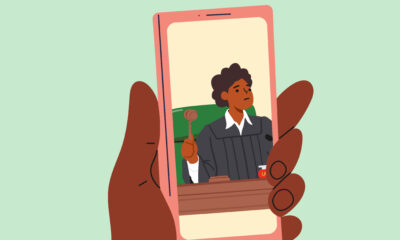Features
Tari Taylaur: We Can Self-Regulate Social Media by Being Mindful of What We Post Online

In October, itchy Nigerian fingers on social media jumped the gun, on more than one occasion, to announce the triumph of Ngozi Okonjo-Iweala in the race for the top job at the World Trade Organisation (WTO). The excitement of having one of our own contend with trade titans from around the world and emerge victorious was one that wasn’t easy to contain. I know because I was one of those bearers of this premature good news.
Now I wonder, if the social media bill had been signed into law prior to October, would we all be paying fines or serving jail terms? Would our enthusiasm at publishing good news have brought the wrath of relevant authorities swiftly on us? The controversial social media bill, also called the Protection from Internet Falsehood and Manipulation Bill (2019), sponsored by Muhammad Musa representing Niger East senatorial district, has received much opposition from Nigerians at home and in the diaspora. It is widely viewed as a tool by the government to suppress free speech and hold the monopoly on truth.
What is to be regarded as ‘falsehood’ remains the big question. “Is something false because the government does not like it or is it false because nobody wants to accept that it is true?” asks Omoyele Sowore, activist and founder of Sahara Reporters. President of the Nigerian Union of Journalists, Chris Isizugo, voiced a similar opinion during a public hearing in Abuja earlier this year. “This bill,” he says, “seeks to pigeonhole Nigerians from freely expressing themselves.”
What does the social media bill actually propose to do?
- To suppress falsehoods and manipulations.
- To counter the effects of such communications and transmissions.
- To sanction offenders with a view to encouraging and enhancing transparency by social media platforms using the internet correspondences.
According to the bill, a person must not transmit a statement that is false or transmit a statement that may:
- Affect the security or any part of Nigeria.
- Affect public health, public safety, or public finance
- Affect Nigeria’s relationship with other countries.
- Influence the outcome of an election to any office in a general election.
- Cause enmity or hatred towards a person or group of persons.
There is nothing wrong with the letter of the bill. In fact, its objectives should be deemed necessary by anyone interested in the peace, security, and unity of Nigeria. The sinister element is in its enforcement and in the motives of anyone charged with the authority to sanction ‘offenders’.
What is the way forward?
Nigeria is not the only country that has sought to regulate its social media landscape. The European Union, in its Digital Services Act, has assigned the role of gatekeeper to social media platforms, in curbing hate speech and extremism.
Ofcom is the UK regulator tasked with ensuring the platforms protect people from harmful, illegal terrorist and child abuse content by removing it quickly and minimising the risk of it appearing. Digital Secretary Baroness Morgan states, “We will give the regulator the powers it needs to lead the fight for an internet that remains vibrant and open but with the protections, accountability and transparency people deserve.”
Sites like Facebook and YouTube generally have their own rules of engagement on how users should relate with one another, and the content users should be exposed to. Between July and September 2019, Google reports taking down 8.8m videos, 3.3 million channels, and 517 million comments. Users are able to flag (or report) content they deem inappropriate, and the platform will act accordingly.
Where does that leave us in Nigeria?
As epic as the #EndSARS protest was as a force for social change, it was also rocked by a high level of misinformation. Players with questionable motives jumped on the public discourse driven by social media to shoot their shots and threaten national stability. It’s clear that social media has provided the forum and tools with which young Nigerians can strategize on the future we want. The responsibility then falls on us to police this arena, to free it of fake news, propaganda, incitement, hate speech, all forms of shaming, and promotion of malicious gossip that ruins people’s lives.
Perhaps social media will self-regulate if every enlightened user makes it his/her duty to educate the next user on the need to verify posts before sharing. Or if more bloggers took time to actually research on a subject matter, and get a balanced perspective before crafting a headline. Maybe if influencers refuse to publish unnecessarily hurtful comments, or delete them from their feeds.
The case for social media regulation by the government becomes redundant if Nigerian youths decide to embark on effective self-regulation on the platforms we use. Each person may have his/her idea of how social media could be a much better place. Let us encourage the expression of diverse ideas, and not vilify others for holding a different opinion.
The magnitude of change that this generation of young Nigerians can produce in our domination of the social media space is unprecedented. The future we all want could be in the next tweet, video, or blog post. Likewise, the future we don’t want!
Let us use wisely.

















